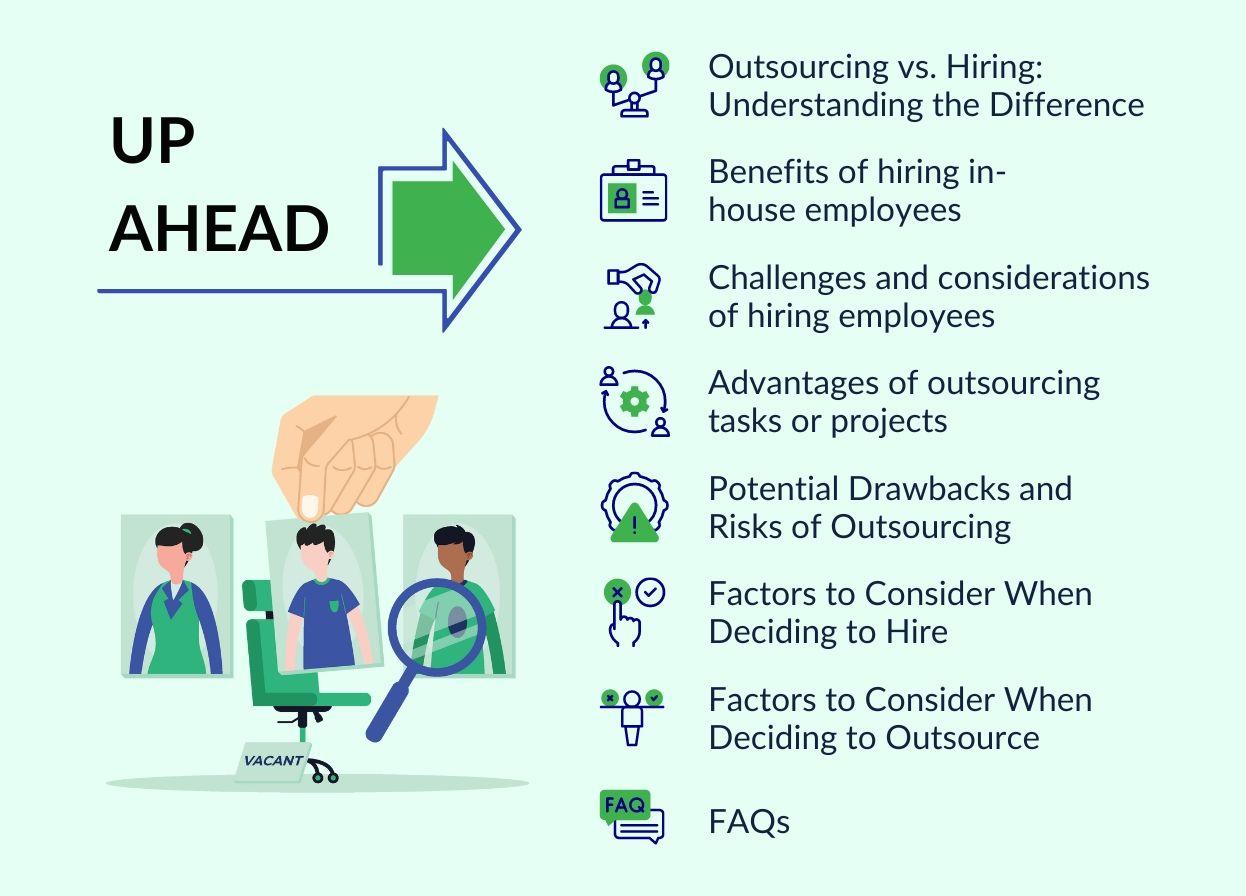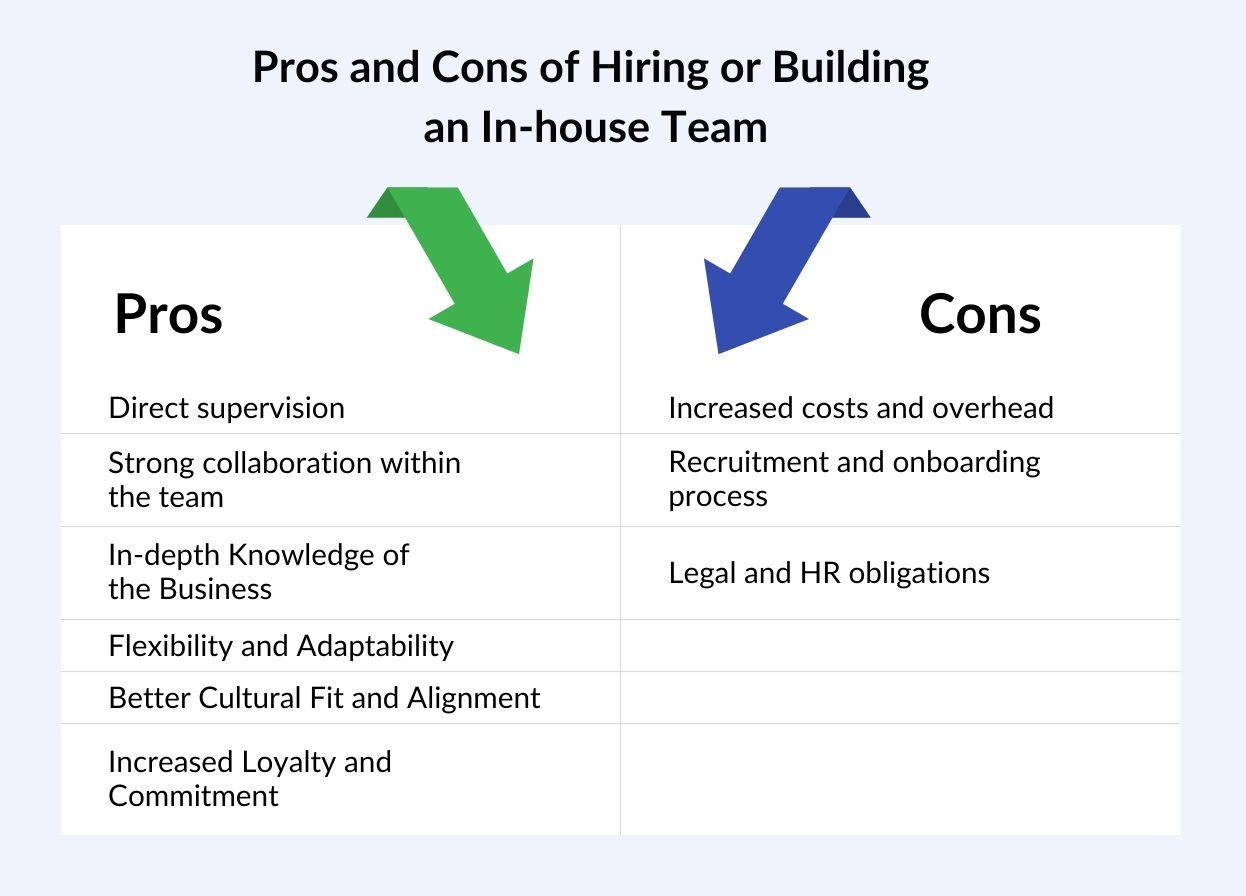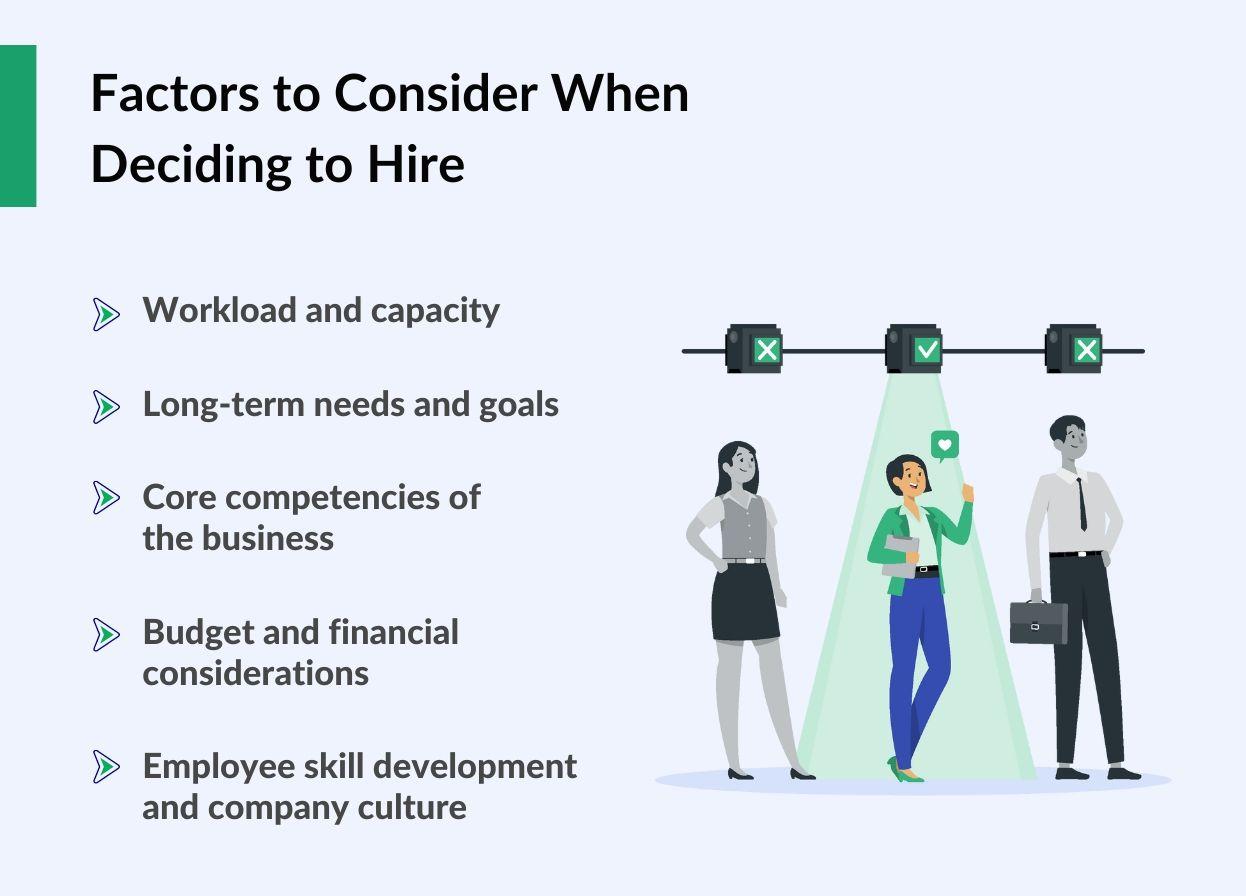When to Hire vs. When to Outsource?


📢 "Outsource areas of weakness."
📢 “Invest in skilled professionals.”
📢 “Entrepreneurs must master every skill.”
📢 “No one understands your business better than you.”
As an entrepreneur trying to figure out how to manage the workload, these phrases may be commonplace. You know the value of expertise in your core services—those elements that define your brand and set you apart in the market. But what about the tasks and responsibilities outside your primary area of expertise, such as accounting, IT, marketing, or HR? Should you build an in-house team or entrust these functions to external specialists?
Let's explore the realm of decision-making and discover the ideal balance for your expanding enterprise globally!
Outsourcing vs. Hiring: Understanding the Difference
Deciding to hire or outsource for your small business is like choosing between baking a cake from scratch or ordering one from a skilled pastry chef. It's about balancing the joy of hands-on involvement and the convenience of relying on an expert to deliver a delectable result.
Both options have unique benefits and factors to consider. Ultimately, your choice should be based on the specific requirements and your company’s future objectives.
Here are the pros and cons of hiring or building an in-house team:

Benefits of hiring in-house employees
- Direct Supervision: Hiring employees in-house allows you to supervise the work done in real-time, and shape and maintain the company culture, ensuring everyone is aligned with your vision and goals. Furthermore, it contributes to better quality control. Companies can maintain a higher standard of work and address any issues promptly, ensuring that products and services meet customer expectations.
- Strong Collaboration Within the Team: An in-house team can undoubtedly foster collaboration and knowledge-sharing, creating a more cohesive environment that ultimately leads to increased efficiency and creativity.
- In-depth knowledge of the Business: In-house employees work daily with the company, giving them a deeper understanding of the mission, values, products, and services. This way, they can make more informed decisions and contribute more effectively.
- Flexibility and Adaptability: As in-house professionals are directly integrated into the company's operations, they can quickly respond to shifts in the market, customer demands, or project requirements. This agility allows the company to stay competitive and seize new opportunities promptly.
- Better Cultural Fit and Alignment: Hiring in-house allows you to carefully select employees who align with the company's culture and values. This alignment contributes to a more harmonious and productive work environment, as employees are more likely to share the same vision and be motivated to work towards common goals.
- Increased Loyalty and Commitment: In-house employees often feel a stronger sense of loyalty and commitment to the company, as they are part of a close-knit team and witness the impact of their contributions first-hand. This sense of belonging can lead to lower turnover rates and higher employee retention, reducing recruitment and training costs.
Challenges and Considerations of Hiring Employees
- Increased Costs and Overhead: Hiring employees involves significant financial investments, such as salaries, benefits, workspace, equipment, and ongoing training.
- Recruitment and Onboarding Process: Finding the right talent can be time-consuming and challenging. Additionally, onboarding requires resources to get new hires up to speed, impacting productivity. However, a well-structured onboarding program helps employees feel welcome and engaged and sets them up for success in their roles.
In some cases, organisations may outsource certain tasks or projects to external vendors. It is essential to exercise due diligence when selecting vendors. Just as with hiring in-house employees, selecting the right vendor is crucial for successful outcomes.
- Legal and HR Obligations: As an employer, you must navigate legal complexities, tax obligations, and compliance with labour laws, which can be burdensome for a small business like yours.
Here are the pros and cons of outsourcing:

Advantages of outsourcing tasks or projects
- Cost-Effectiveness and Scalability: Outsourcing allows you to tap into external resources, saving you the expenses of recruiting, training, and maintaining an in-house team. Additionally, you can scale your operations up or down based on your business's needs without being burdened by fixed costs.
- Access to Specialised Expertise: Outsourcing to established firms, and in today's day and age, say to an AI development company, gives you access to a pool of specific skills and knowledge that might not be available within your organisation. This means tasks are handled by professionals who excel in their respective fields, ensuring a higher quality of work.
- Reduced Infrastructure and Overhead Costs: By outsourcing, businesses can avoid the need to invest in additional infrastructure or bear the burden of overhead costs associated with in-house operations. When it comes to operational or legal functions, outsourcing processes could be supported by Employer of Record services in Romania, Mexico, India or other global outsourcing hubs.
- Time Savings: Outsourcing tasks to experts can save time and expedite project completion. External providers are often experienced and equipped to handle specific tasks efficiently.
Potential Drawbacks and Risks of Outsourcing
- Lack of Direct Control and Supervision: Entrusting tasks to external providers means relinquishing some control over the processes. This could lead to concerns about meeting quality standards, timelines, and overall performance.
- Potential Communication and Cultural Barriers: Miscommunication can cause delays and errors. Cultural differences between the in-house team and the external provider can also impact the working relationship. Aligning cultural aspects is challenging but essential for a cohesive working environment.
- Dependency on External Providers: Relying heavily on external expertise might create dependency issues, making it harder to bring certain operations in-house later or switch providers if necessary.
- Flexibility and Agility: In certain cases, external providers offer the flexibility to accommodate fluctuating workloads and deadlines. However, it may seem counterproductive for time-critical deliverables, whereas an in-house team may prove to be more useful in such scenarios.
Factors to Consider When Deciding to Hire
When considering hiring new employees for your small business, it is important to take into account several crucial factors, such as:

1. Workload and Capacity
Assess your current workload and the ability of your existing team to handle it. Hiring may be necessary if the workload consistently exceeds the team's capacity and affects productivity or customer satisfaction.
For example, during COVID-19, a virtual meeting platform experienced a surge in orders, resulting in longer service times. The company hired additional employees to meet the increased demand while maintaining service quality.
2. Long-Term Needs and Goals
Contemplate your long-term business objectives and whether hiring aligns with them. Hiring employees should be a strategic decision that supports your company's growth and sustainability.
3. Core Competencies of the Business
Identify the core areas of expertise that define your business and contribute to its competitive advantage. Hiring in-house for these roles allows you to retain control and preserve your unique value proposition.
4. Budget and Financial Considerations
Evaluate your financial position and the cost of hiring new employees. Consider not only salaries but also benefits, training expenses, and any additional overhead costs. If your budget is constrained, outsourcing specific functions, like bookkeeping or digital marketing, may be a more cost-effective solution for your business.
5. Employee Skill Development and Company Culture
Reflect on your desire to cultivate a strong company culture and promote employee skill development. Hiring permanent employees can lead to long-term investment in training and skill enhancement.
For instance, a tech service export business that values a collaborative culture may hire full-time employees, fostering a cohesive team that can work seamlessly together.
Factors to Consider When Deciding to Outsource
Before deciding to hire to outsource certain aspects of your business, these factors will help you determine whether outsourcing is the best option for your unique needs and requirements.

1. Task or Project Complexity
Assess the complexity of the task or project at hand. If it requires specialised skills or knowledge that your in-house team lacks, outsourcing to experts in the field can ensure higher quality and efficiency.
For example, a software development service company must build a mobile app with advanced AI functionalities for its clients. Outsourcing the AI component to a specialised AI development firm would likely yield superior outcomes compared to handling it in-house with limited AI expertise.
2. Short-term or Project-Specific Requirements
For tasks that are temporary or project-based, outsourcing offers a viable solution. This way, you avoid the burden of recruiting, training, and managing additional staff for short-lived needs, and instead, leverage the expertise of an external team.
3. Cost analysis and budget constraints
Carefully evaluate the cost of hire outsourcing versus in-house operations. In some cases, outsourcing may prove more cost-effective, particularly when considering expenses like employee benefits, training, and infrastructure.
4. Access to Specialised Knowledge of Technology
Outsourcing grants access to specialised knowledge, skills, or cutting-edge technologies that may not be feasible or practical to develop in-house. This advantage can lead to improved outcomes and a competitive edge in the market.
5. Experimenting with a New Capability
Outsourcing initially allows you to test the waters without significant commitments when exploring a new capability or business line. Once the potential is proven, you can consider bringing the function in-house if it aligns with your long-term strategy.
6. Role Unlikely to be Core to the Organisation
Some tasks or roles may not align with your company's core competencies or long-term goals. In such instances, outsourcing enables you to focus on your strengths while delegating non-core functions to external specialists.
For example, bookkeeping and accounting, while essential, may not be the primary driver of your business success. Outsourced hiring these tasks to an accounting firm allows you to concentrate on your core products or services.
Final Words
Considering the information above, which option would you choose? Outsourcing or hiring? The answer is both! The key lies in recognising the uniqueness of your business and tasks.
By harnessing the strengths of in-house teams for core expertise and leveraging the advantages of outsourcing for specialised tasks, you can create a harmonious synergy that propels your business to new heights.
Seize the opportunity to strike the perfect balance, unlocking the door to success in your entrepreneurial journey!
Frequently Asked Questions
Q1. Is outsourcing only suitable for large enterprises, or can small businesses benefit as well?
Ans: Outsourcing is suitable for businesses of all sizes. Small businesses can particularly benefit by gaining access to specialised skills and reducing operational costs.
Q2. What are the main challenges of hiring in-house employees for small businesses?
Ans: Challenges include increased costs, recruitment complexities, legal obligations, and the need for ongoing training. These factors can be particularly burdensome for small enterprises.
Q3. Can outsourcing lead to a loss of control over business processes?
Ans: While outsourcing involves relinquishing some control, proper communication and collaboration strategies can help mitigate potential issues and ensure alignment with business goals.
Q4. How can small businesses ensure the quality of work when outsourcing tasks?
Ans: Careful vendor selection, clear communication of expectations, and periodic performance evaluations are crucial for maintaining high-quality work when outsourcing.
Q5. Is it possible to switch from outsourcing to in-house operations or vice versa?
Ans: Yes, it is possible, but careful planning and consideration of the specific task or function are essential. Transitioning may involve challenges, so a strategic approach is recommended.
Q6. What factors should be prioritised when deciding whether to hire or outsource?
Ans: Factors such as task complexity, long-term business goals, core competencies, budget constraints, and the need for specialised knowledge or technology should be given priority in the decision-making process.
Q7. Can outsourcing be a temporary solution before bringing a function in-house?
Ans: Yes, outsourcing can serve as a valuable testing ground for new capabilities or projects. Once the feasibility and potential are established, a business may choose to bring the function in-house if aligned with its long-term strategy.












